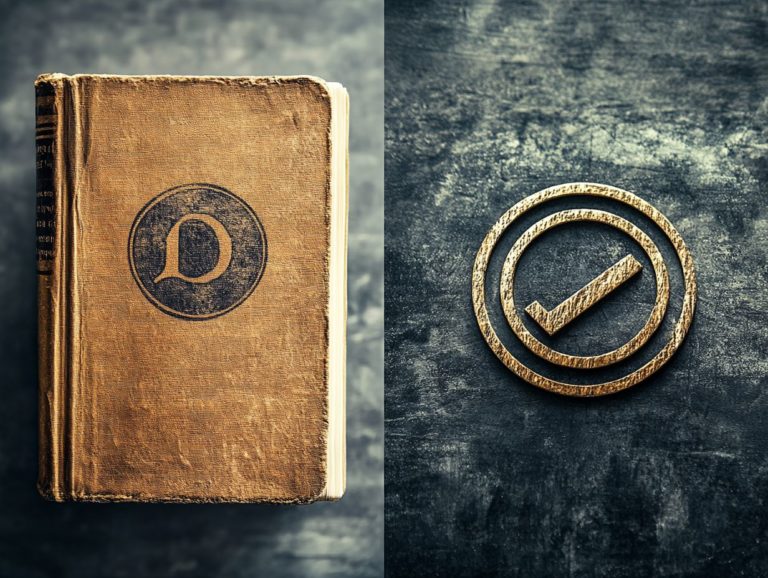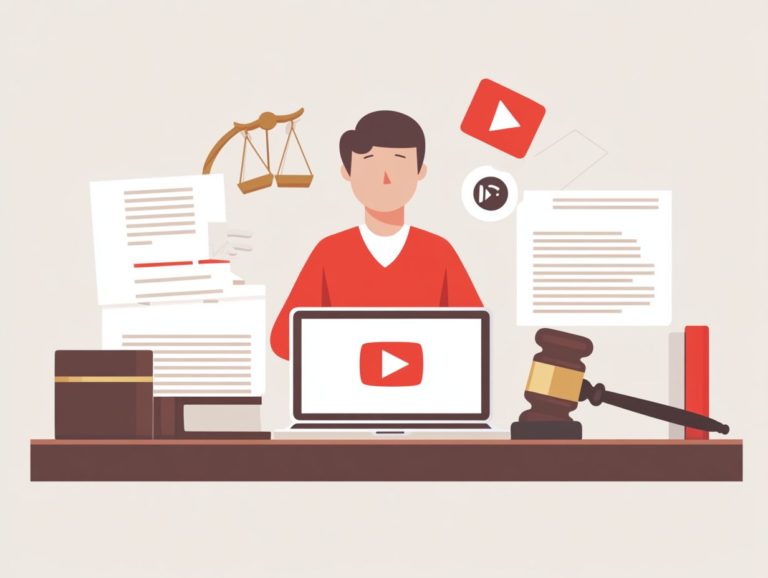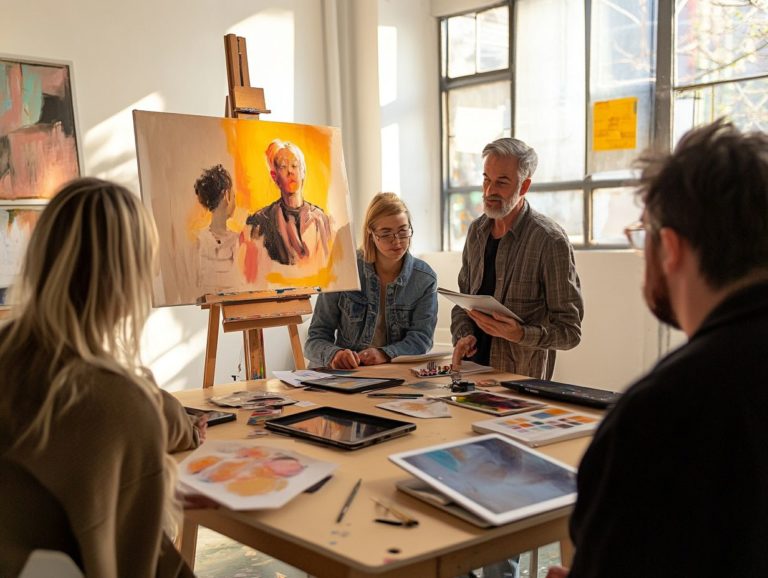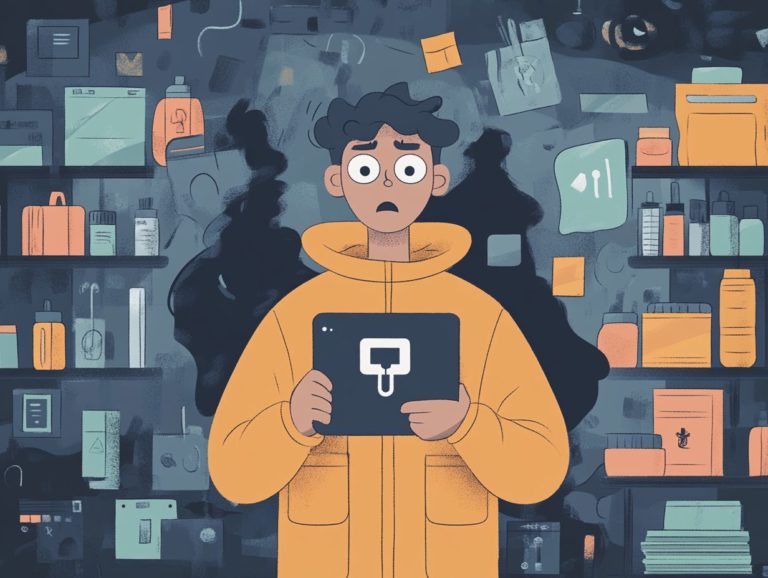The Importance of Copyright in the Music Industry
Copyright is crucial in the music industry. It ensures artists are recognized and fairly compensated for their amazing creative work.
This article delves into what copyright entails within the realm of music. It highlights its significance for musicians and the various avenues available for protecting this invaluable intellectual property.
It also looks at common types of copyright infringement and the repercussions that can ensue. Additionally, it discusses the challenges musicians face in safeguarding their rights in the digital era.
By the end of this discussion, you will be equipped with essential knowledge to protect your creations effectively.
Contents
Key Takeaways:
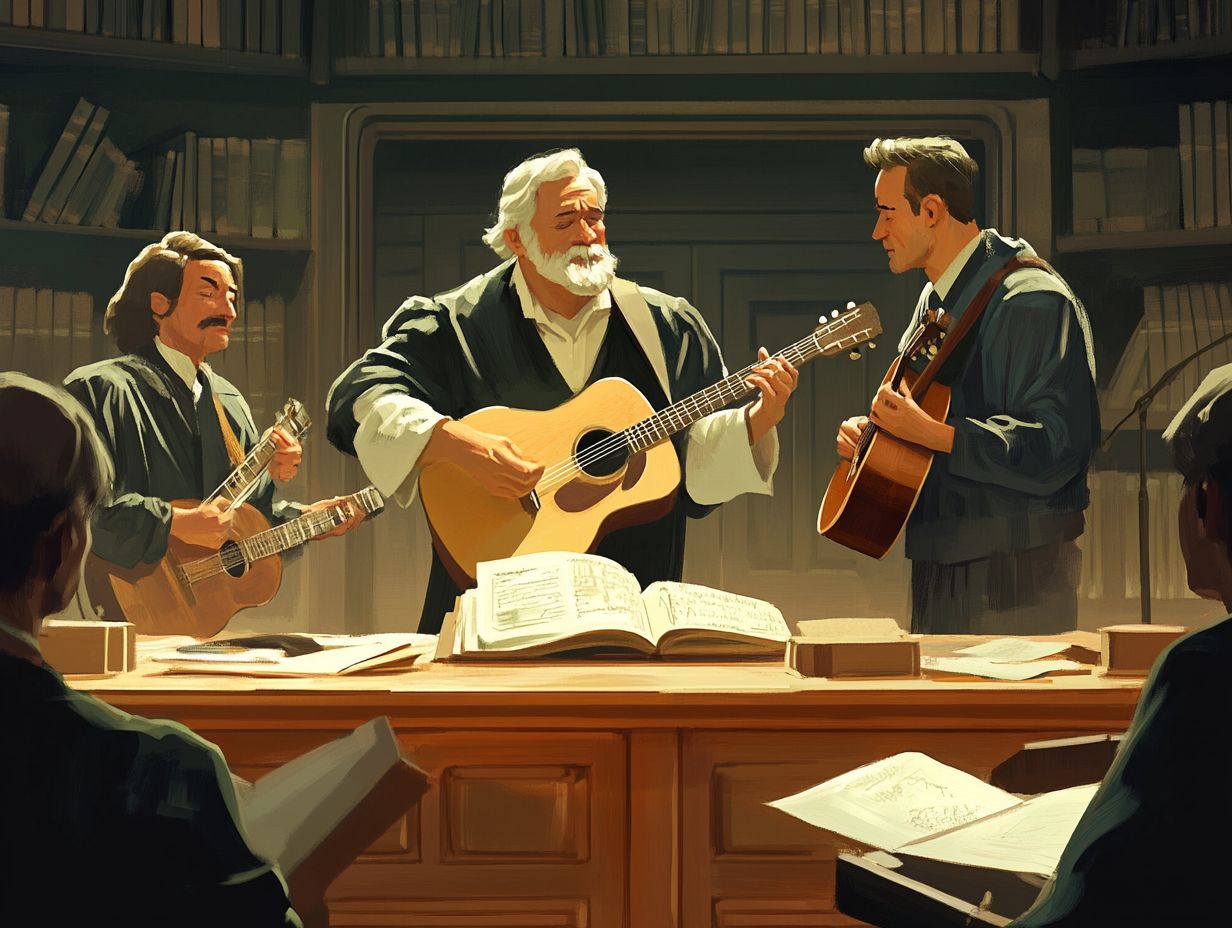
Copyright protects musicians’ intellectual property. It gives them the right to control how their music is used and distributed.
Copyright can provide financial benefits for musicians by allowing them to receive royalties for their music and preventing unauthorized use by others.
Infringement of copyright in the music industry can result in legal consequences. It can be avoided by properly registering and protecting your music.
Understanding Copyright in the Music Industry
Understanding copyright in the music industry is essential for you as a music rights holder. It involves a spectrum of legal protections designed to protect your creative work, making resources like understanding copyrights: definition and importance invaluable.
Copyright law ensures that you receive recognition for your work. It also secures your financial interests through royalties earned from music distribution and performances.
This legal framework protects your intellectual property. It prevents unauthorized use of your recordings and compositions, allowing you to focus on what you do best creating music.
What is Copyright and How Does it Apply to Music?
Copyright is a legal concept that grants you exclusive rights over your original works, including music. It offers protection against unauthorized use and reproduction.
This legal framework fosters creativity by allowing you to control how your music is utilized and distributed.
Regarding music, copyright has two key distinctions: the composition copyright protects your musical notes and lyrics. The sound recording copyright safeguards the actual performance and recording of those notes.
To reap the benefits of these protections, you may wish to pursue copyright registration. This formalizes your ownership and can provide additional legal advantages should infringement occur.
Keep in mind that copyright protection isn t eternal; it typically lasts for your lifetime plus a set number of years. This ensures that your artistic rights are upheld while eventually permitting public access to your work.
Why Copyright is Important for Musicians
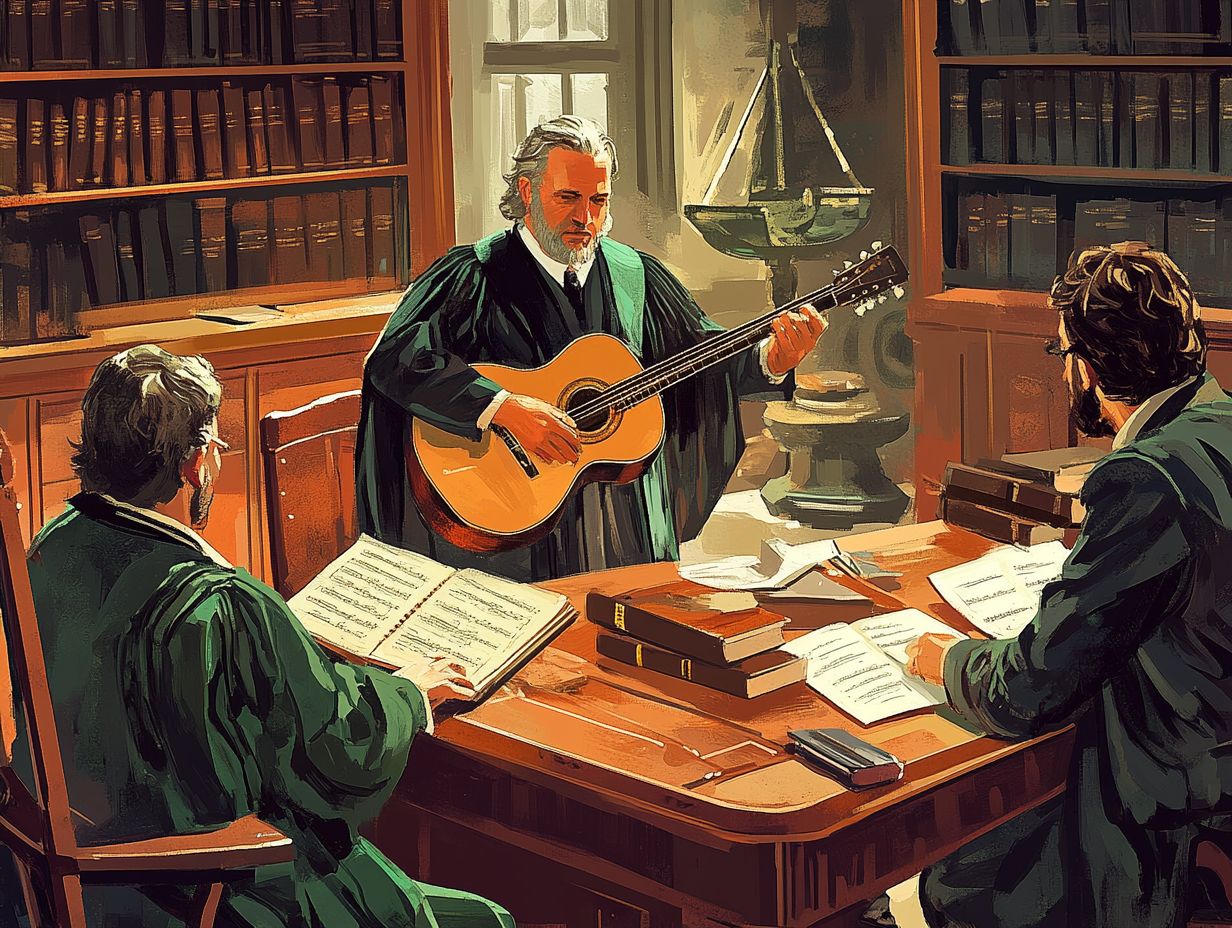
Copyright holds significant importance for musicians, but it also plays a crucial role in other fields. For instance, in fashion, understanding the role of copyright in the fashion industry is essential as it safeguards creative works and ensures appropriate compensation.
This protection is essential for enabling musicians to sustain their careers in the dynamic and ever-evolving music industry.
Protection of Intellectual Property
The protection of intellectual property in the music industry is absolutely essential. It ensures that you, as a music rights holder, maintain control over your creations and prevent any unauthorized use or exploitation.
This protection becomes even more critical considering the vast array of music genres be it classical, jazz, hip-hop, or electronic each possessing unique qualities that deserve proper acknowledgment.
Copyright law plays a pivotal role in this landscape. It safeguards original expressions across various formats, including recordings, sheet music, and digital downloads.
By clearly establishing the rights of songwriters, musicians, and producers, it fortifies the industry against piracy and unauthorized sampling. This fosters an environment ripe for creativity and innovation.
When you feel secure in your rights, you re far more likely to invest your time and resources into new projects. Ultimately, this enriches the cultural landscape and benefits audiences around the globe.
By understanding copyright, you can take charge of your creative future. Protect your music and thrive in your artistic journey!
Financial Benefits
One of the key financial advantages of copyright for you as a musician is the ability to generate income through music royalties from various channels. These include music distribution, streaming services, and live performances.
These royalties can significantly enhance your overall income. They foster a more sustainable career in an industry characterized by its ups and downs.
Platforms like Spotify and Apple Music are pivotal in today s music scene. They enable you to reach broader audiences and provide a consistent revenue stream through per-stream payments.
Live performances provide immediate financial returns and serve as essential promotional tools. They allow you to connect with fans while earning income from ticket sales and merchandise.
By leveraging this blend of income sources, you can build a more secure financial future for your musical journey.
Copyright Infringement in the Music Industry
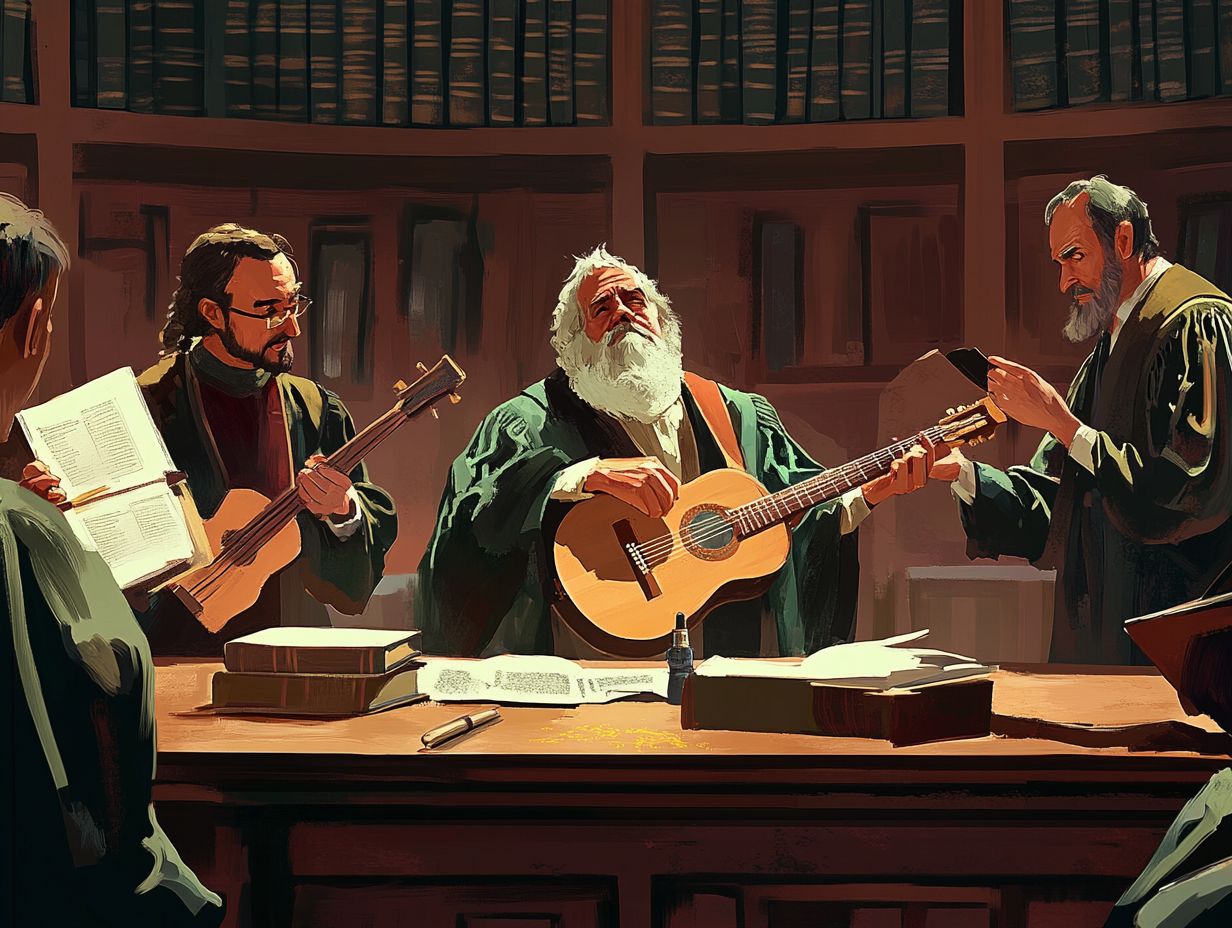
Copyright infringement is a serious concern in the music industry. Unauthorized use of copyrighted material can result in substantial financial losses for artists and create legal headaches for those who infringe.
It’s essential to understand the implications of such actions. They undermine the hard work and creativity of artists and expose infringers to potential legal repercussions.
Common Forms of Infringement
Common forms of copyright infringement in the music industry include unauthorized sampling, unlicensed digital distribution, and public performances held without permission. These actions significantly undermine the rights of copyright holders.
Engaging in such practices can lead to substantial financial losses for artists who depend on revenue from their original works. For example, when a producer samples a track without obtaining permission, it doesn t credit the original artist and can set the stage for costly legal disputes.
The emergence of music streaming platforms has intensified this problem. Users frequently share copyrighted material without the necessary licenses, further eroding the value of original compositions.
To protect intellectual property, licensing music and securing reproduction licenses are essential steps. This guarantees fair pay for artists, fueling creativity and innovation in music!
Consequences for Infringement
The consequences of copyright infringement can be severe. They can lead to legal actions, hefty damages, and a potential reputation crisis for individuals in the music industry.
When you find yourself at the center of copyright disputes, you re not just facing monetary penalties. There s also the looming threat of lawsuits that could drain your resources and stifle your creative freedom.
Copyright enforcement agencies are on the front lines, diligently monitoring and protecting intellectual property rights. They ensure that those who violate these laws are held accountable.
The fallout from such infringements goes beyond immediate legal troubles. It can tarnish your career and undermine your credibility in an industry that thrives on trust and originality.
Therefore, maintaining ethical standards is essential for achieving long-term success.
How to Protect Your Music Copyright
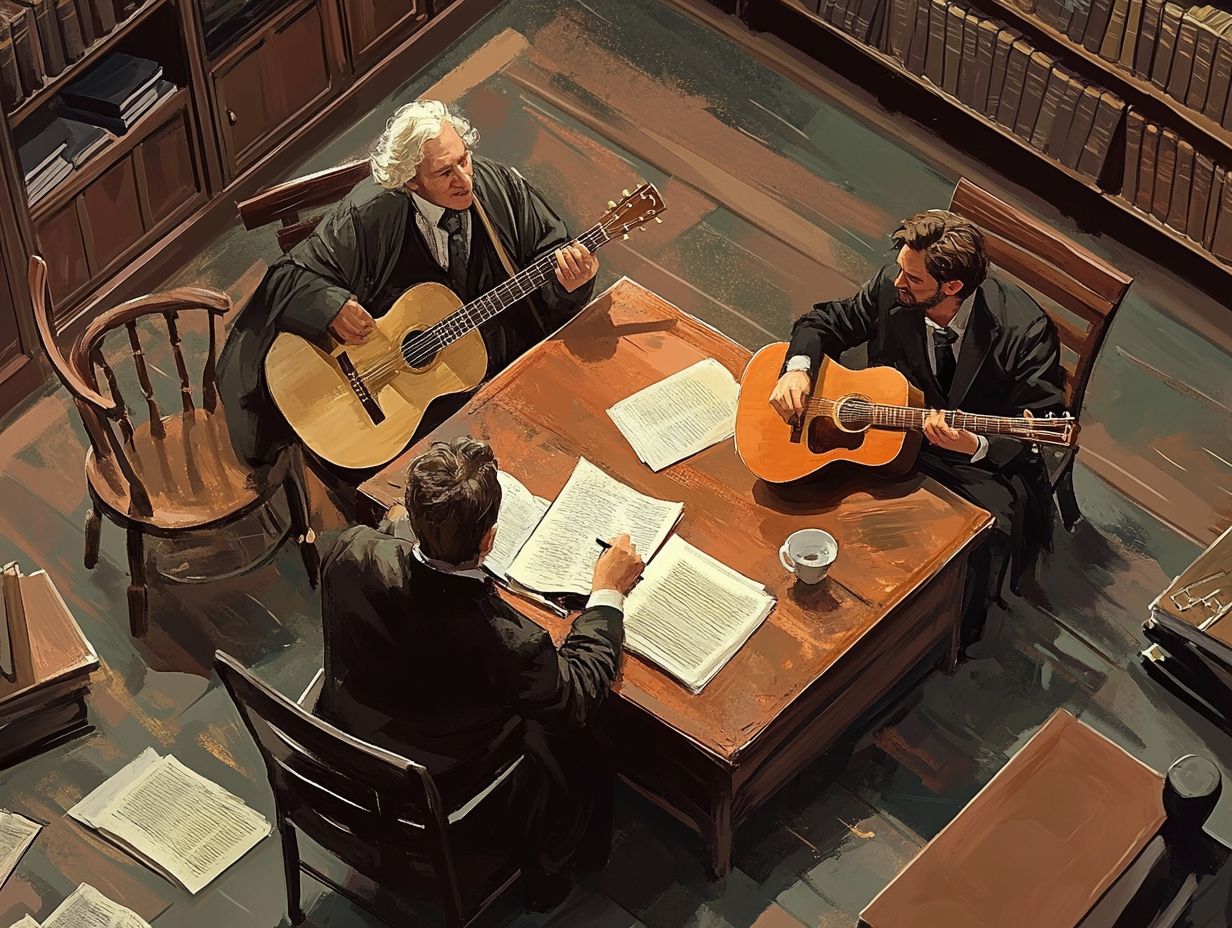
Protecting your music copyright is vital now more than ever! It all starts with a solid understanding of the copyright process. Registering your works ensures you secure your rights as a music rights holder.
Registration and Legal Considerations
Registering your music copyright is an essential step that provides legal proof of ownership. This process opens avenues for enforcing your rights against infringement.
The process starts with filing an application with the U.S. Copyright Office. You ll need to complete specific forms and pay a fee to get started.
Essential documents typically include a copy of the work you wish to register. This could be a written score, a digital audio file, or a recording. By keeping detailed records throughout this registration process, you can support your claims should any disputes arise.
Copyright registration enhances your legal protection and allows you to file lawsuits in the event of infringement. This gives you a significant advantage in enforcing your rights and securing compensation for any unauthorized use of your work.
Navigating copyright laws in the digital age presents unique challenges for musicians.
With the rise of digital music and streaming services, copyright infringement has become both more common and complex.
Challenges and Solutions for Online Copyright Protection
Online copyright protection faces significant risks of infringement through unauthorized downloads, sharing, and streaming of digital music. This reality requires strong compliance measures from music rights organizations.
In today s fast-paced digital landscape, artists and record labels often struggle with the widespread culture of piracy that threatens their revenue. Unauthorized use of music not only impacts creators financially but also diminishes the motivation to produce new content.
To address these challenges, consider implementing advanced technologies like digital watermarking a method to embed information into your music files and blockchain, a secure digital ledger. These innovations can help track and verify ownership, ensuring that only authorized parties benefit from the music.
Strengthening legal frameworks and pursuing international agreements can create a broader strategy for safeguarding artistic rights. This approach enables creators to reclaim control over their work in a world that eagerly consumes music yet often overlooks the need for protection.
Frequently Asked Questions
- What is copyright and why is it important in the music industry?
Copyright is a legal concept that gives creators exclusive rights to their original works. In music, it protects musicians and ensures they are compensated for their creations. - What are the benefits of copyright in the music industry?
Copyright allows musicians to control their work, receive fair compensation, and prevent unauthorized use. It promotes creativity by encouraging artists to share their unique creations. - How does copyright protect musicians in the music industry?
Copyright grants musicians the exclusive right to reproduce, distribute, perform, or display their music. It also allows them to license their work and receive royalties, preventing unauthorized use. - What are some common copyright issues faced by musicians?
Common issues include copyright infringement using a musician’s work without permission unauthorized sampling or remixing, and plagiarism of lyrics or melodies. - How can musicians protect their copyright?
Musicians can protect copyright by registering their works, using copyright notices, and having written agreements for collaborations. Monitoring and enforcing their copyright is also crucial. - What are the potential consequences of copyright infringement?
Consequences can include legal action, requiring the infringer to pay damages and ceasing use of the material. It can also harm the original artist’s reputation and financial stability.
Take action today! Register your copyrights and consult a legal expert to better protect your music.


